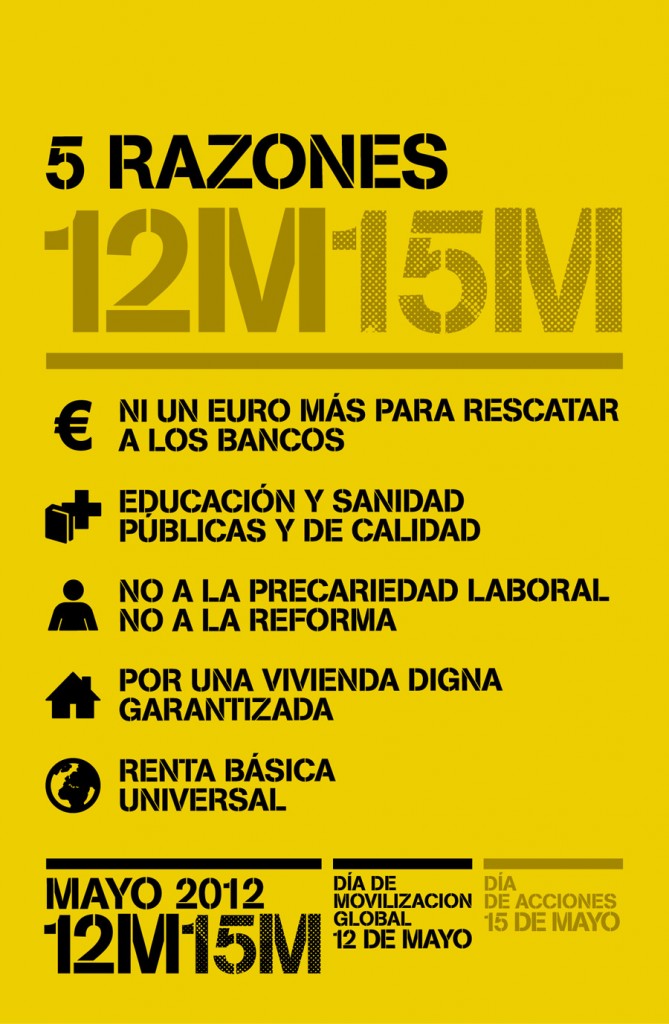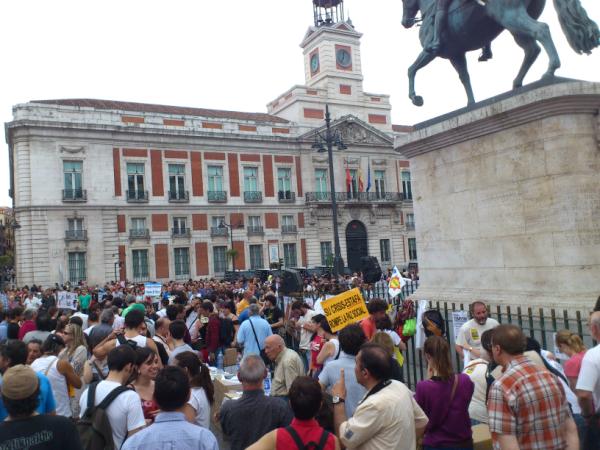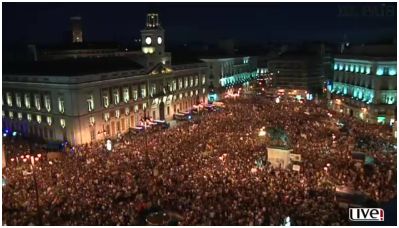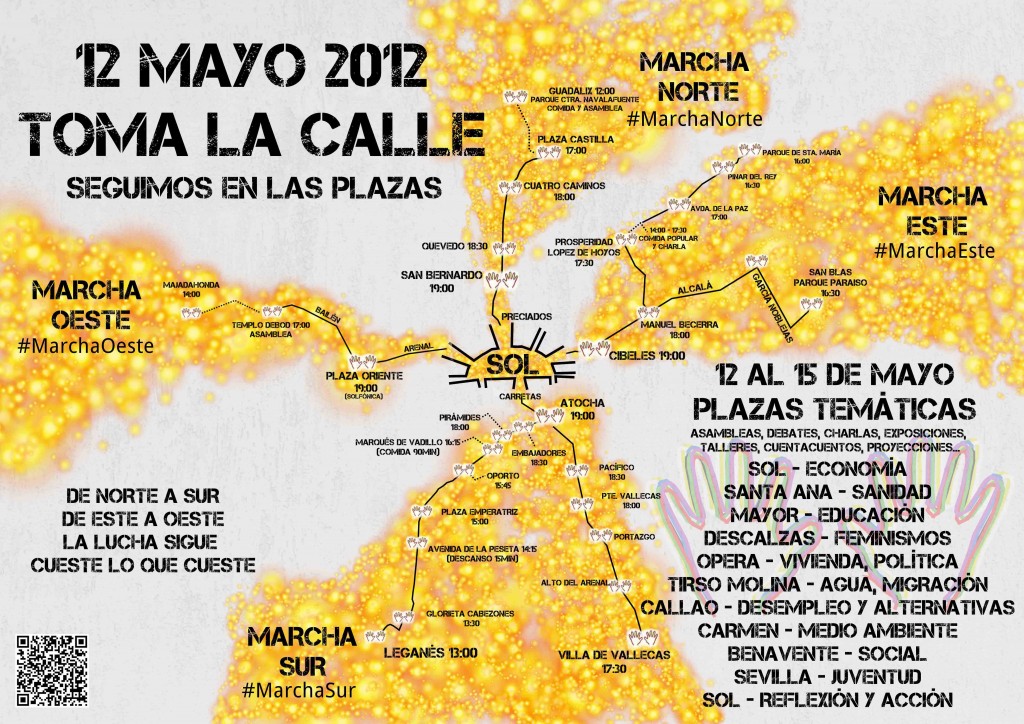In New York, the General Assembly has been in effect suspended for some time because Facilitation has withdrawn its support for a process that had become increasingly dysfunctional. As we look at the impressive mobilizations across Spain today for 12M (European style dates), it might be worth taking a look at the ways in which they have structured the events. I’m looking only at a few public documents, of course, and I have not been part of any discussions.
But whatever they’re doing, it seems to be working. There’s a sense of a real dual-power structure in Spain and above all in Greece, where the elections have confounded the austerity consensus.
Democracia Real Ya, the prime movers of the M15 occupations a year ago, has recently registered as an association, causing some strong dissent among its supporters. Its themes for M12M15 as outlined above nonetheless seem to have been adopted quite widely. The basic themes were elaborated by the Assembly in Barcelona into six themes for discussion:
1. Not one more euro to rescue banks. Citizens’ debt audit. We will not pay illegitimate debt created by those who caused the crisis.
2. Education and health financing and public management, free and of quality. Do not cut public spending, no to the privatization of public services. No repayment.
3. Fair distribution of work and wealth. No to precaritization. No to retirement at 67. Withdrawal of the Labor Reform. Valorization of reproductive, domestic and care labor.
4. Guaranteed right of access to decent housing. Retroactive payment in kind. Spaces for affordable socializing housing. Promotion of housing cooperatives.
5. Tax reform to redistribute wealth fairly, which we all, men and women, produce together. Universal basic income for all people.
6. Defense of the rights to assembly, demonstrate, strike, unionize and all civil liberties including the right to control one’s own body.
These might be said to be principles more than demands, as there is no chance that the current Spanish government will implement them.
The Assembly has created a set of levels of organization for the discussion in the General Assembly that are more detailed than those normally used in New York.
Facilitation (3 people): Responsible for the dynamics of the assembly.
Containment (6 people): Responsible for managing the people who want to speak to the assembly urgently, questions of process, and specific incidents
Take the floor (6 people): Organize one aisle and recognize speaking order evenly across the space. We suggest carrying an identification poster.
Meeting minutes (2 or 3 people): will be taken into Castilian and Catalan. After the assembly, minutes to be pooled and scanned to get a summary to post on the web. Will seek to record the sound of the assembly to complete the written record.
Timing of interventions (1 person): Controls speaking time with a stopwatch and will signal the speaker to remind them when 1 minute remains (requires sign).
Collection of information (2 people): Charged with collecting and sorting the names of the collectives that want to participate in block 3B and explain the dynamics of this block. This information will be passed to the communicators with facilitation. Will be next to the calendar or poster information to fill in the days during interventions.
Communicators with facilitation (2 persons): Gather information and communicate with facilitators.
That’s a team of 23 people to run the assembly. It’s true that for the most part, Occupy in the US has had no need of such complex structures, as we have not had the numbers. It also shows what the challenges would be to get from where we are now to such a place.
After the People’s Assembly on May Day, which I would guess was about 700 people, Marisa Holmes and others publicly (FB status=public, right?) expressed frustration that the Assembly had lost the opportunity to hold the kind of focused discussions envisaged in Madrid, Barcelona and other Spanish cities. If that Assembly had been able to issue a set of six articulated principles like those formulated by Barcelona, that would have been very interesting.
Because although New York’s movement is much smaller in numbers, it benefits from what you might call global media sensory ratios. Marshall McLuhan suggested that cultures have sensory ratios by which they determine the relative priority of the senses, so that in some cultures hearing is central, whereas in others it might be vision. Of course, all the senses are in fact mixed together so it’s somewhat arbitrary how these ratios are defined.
By global media sensory ratios, I mean something much simpler: how much media “noise”/”spectacle” does an event have to cause to be noticed worldwide? Here events in New York have a very low threshold, whereas a similar event in Spain has to be, as we’ve seen, about ten times the size, and one in a dominated nation like Indonesia larger still. On the other hand, if it suits, a small protest like yesterday’s in Moscow, can make global headlines–in this case, to keep pressure on the BRIC nations.
In Madrid, the gathering has been substantial throughout the day and has met the threshold for coverage as the lead item on the BBC News website at 19.00 Eastern. No sign of the events whatsoever on the New York Times front page, or even on its World page. Moscow’s protest is right there on page one.
By midnight in Madrid, the time the permit for the rally officially expired, the crowd was immense–full details in El Pais here. No sign of anyone leaving and no sign of a police effort to evict the Indignados. It’ll be interesting to see whether they try and establish an overnight camp or not. If they do, and succeed, that would be a direct assertion of the movement’s power over government edict. It’s clear at any rate that they could do so–the question is whether to risk violence.
Around the same time, efforts to form a new government in Greece had to be abandoned because Syriza stood by its principles on refusing the Troika’s conditions and would not join in a coalition. So the 12M organizing is working–on a transnational basis so far but there are bound to be repercussions in Spain if Greece renegotiates its deal or simply defaults. One year in and things are just beginning to get interesting.






